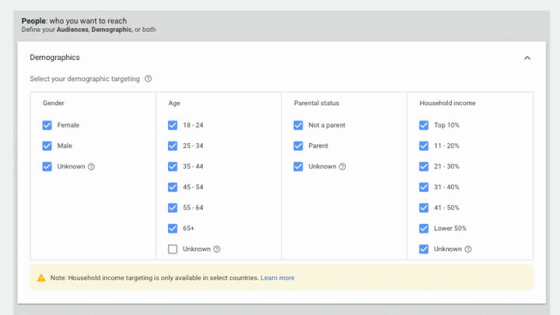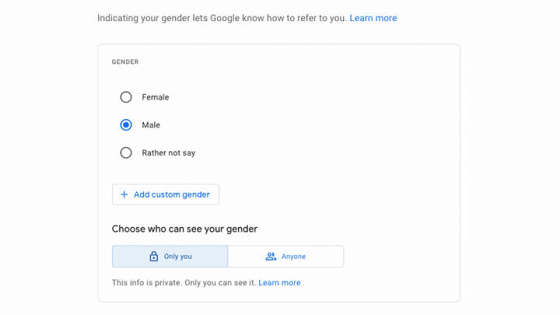It turns out that Google was able to exclude people of ``gender: unknown'' in job advertisements

by
People who have a gender standpoint that is not limited to either male or female are expressed as ' X-gender ' or 'non-binary', but in the advertising system provided by Google, advertisers only advertise jobs for non-binary people. It turned out that it was possible to prevent it from appearing.
Google Has Been Allowing Advertisers to Exclude Nonbinary People from Seeing Job Ads – The Markup
https://themarkup.org/google-the-giant/2021/02/11/google-has-been-allowing-advertisers-to-exclude-nonbinary-people-from-seeing-job-ads

When advertising on the Internet, advertisers can narrow down the users who display advertisements by age, gender, interests, interests, regions, etc. in order to improve the performance of advertisements. This kind of targeted advertising is common nowadays, and Google, which operates an ad network , also adopts it.
On the other hand, based on the anti-discrimination law in the United States, Google has clarified in its advertising policy that ``we do not allow targeted advertising that excludes men or women in advertisements for recruitment, housing, or financial products.'' However, non-profit news site The Markup revealed that Google was giving advertisers the option to exclude non-binary people. In fact, in YouTube ads, two companies, FedEx and Dewey Pest Control, were showing ads excluding non-binary. Google has confirmed The Markup's report, with spokesperson Elijah Lawal saying that 'around 100 of the tens of thousands of advertisers' used non-binary YouTube ads. I'm here.
Kendra Albert, a legal lecturer at Harvard Law School, said transgender and non-binary people face severe job discrimination and that they 'know what they don't know' in job advertisements. increase. Google's advertising options are believed to constitute such discriminatory practices.
On the other hand, FedEx and Dewey Pest Control have refrained from commenting, and it is not clear whether the option was intentional.
Advertisers using Google's system can specify target users using checkboxes like the one below. By default, all items in the box are checked, and the advertiser can narrow down the target of the advertisement by unchecking it. However, Google says that it does not reflect designations such as age, gender, household income, and parental status for recruitment, housing, and financial products by 'internal process'.

However, in the gender item, 'Unknown' including non-binary etc. was not blocked by the internal process.

``The Unknown category is intended to refer to users whose gender could not be determined or guessed, and is not intended to exclude users from targeting based on gender identity,'' Lawal said. However, Unknown also includes options such as choosing 'I don't want to say' about gender in Google account settings and customizing gender.

``We will be updating our policy in the coming weeks to restrict advertisers from targeting the 'Unknown' gender,'' Lawal said.
Related Posts:
in Web Service, Posted by darkhorse_log







